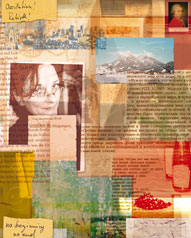For the last few evenings I have indulged in intellectual fast-food: Elizabeth Gilbert’s #1 New York Times Bestseller “Eat, Pray, Love”.
My better half got startled more than one out of his incestuous Austrian Mailer-world, when I giggled out over one or the other passage in this girly womanly book.
I finished it last night and only today, pretty much exactly 24 hours later, I can feel anger rise in me. I feel like I’ve been had – or rather, I feel angry with myself for having transgressed my intellectual diet. Don’t get me wrong, I do like a bit of mental junk food, just as the next brainy gal, but this is like pigging out on a shitty domino’s pizza wtih some chili cheese fries and a half-assed milkshake. You
think it tastes good at the time, but the next day when you look in the mirror and match your poofy eyes with your hands swelled up with sodium that you get mad at yourself for letting things slide. Again.
“But you seemed to really like it”, said my better half just now, “you had a few laughs, didn’t you”. Sure I did, because it is one of those reads that are just breezily familiar, uncomplicated, seemingly understanding you, me, the reader. The maths are pretty simple: I belong to the fifty percent of American women, and the seventy five of academic women, whose marriage didn’t make it through her thirties; who was left childless mostly out of choice; who makes a career of her intellect; who is well traveled, and multi-lingual. So I find plenty of docking points with the narrative, and if Gilbert has one major talent, it is suggesting familiarity: you feel you have known her character for ages. In fact, at times it feels that you are that character. That is a formidable accomplishment right there. So, I laughed, I identified with the book. Why then am I so incensed?
Because in its very title it proposes a deal that turns out to be as reliable as an unsecured mortgage taken out five years ago. Here is how it works: the eating part is the Greek gift: the character flees to Italy for four months to escape a horrible divorce (well, which divorce isn’t?) and a catastrophic rebound (yep, been there, done that, too). She convalesces with the help of excellent food (pasta/pizza gaining her a luscious 26 pounds) and Italian lessons (a “useless” language in her words).
But it works. I love Rome, I really do. And I, too, utterly eclipsed all the museums and the Vatican the first time I was there, because Roman life just washed me into other parts of the city. So by the time I was a third into the book, I really identified with the character, her post-divorce pain and the ridiculous temptation to call the no-good rebound and get some more of that pain going. Plus I share her fascination with this steadily flowing ancient capital with its beautiful men, the out of this world ice cream and the magic of its walks.
And then, just as I have been utterly reeled in, I get screwed over in the deal. The second part is called “pray”, but would better be called “shit”. Let me explain my suggestion: The character continues her journey to India to do some soul-searching in an Ashram. There is nothing inherently wrong with this – in fact, in its descriptions and references the chapter is in parts even informative and not just entertaining. The reader learns about different Hindu and some Buddhist ideas, about meditation, and what life in a carefully arranged spiritual community brings forth – in you and others. That is commendable, for sure, but already my chest is getting this light tightness from rising anger: not only do we learn about these things; it turns out that our pasta munching New York divorcee is a natural when it comes to these insightful issues and after a few weeks plucks off some of the finest fruit to be had on the meditation tree. And that, mind you, after confiding just a wee bit earlier that she has what the Buddhist call “monkey brain” and no way to control it. I know people that have been meditating for years and have the hardest time to get through that layer of noise that rages in our head, particularly when we want it to be quiet in there. But hey, maybe she is just more plugged in, maybe she can take the fast-lane to spiritual success… suffice it to say that by the time our heroine leaves the Ashram, she is fixed. She found meditational bliss, understood much about how the universe works, and has been able to summon her pissed-off ex-husband’s spirit to have that final talk and settle the emotional bill.
It is at this point that I heard my inner voice for the first time: if only things were so easy. The women I know who got divorced in a, shall we say, unfriendly manner don’t really experience this sort of neat resolution, but must carry their grief and pain with them for much longer than our spiritual super-girl. Well, maybe it’s because she is so flawlessly gifted, so single-mindedly determined, so New York funny, such an American achiever, this successful writer with her insights and her righteousness. Maybe it is because this is all about her, that my allergy kicks off. When I reach the last third of the book I am thinking “shit”, because I feel the old infection is gaining ground, the one that I – like most women in the western influenced world - caught during my life-long exposure to US-fabricated feminine ideals. It is called: perpetual insufficiency. Why didn’t I become such an intellectual Barbie-doll and shine my perfect spiritual teeth in the aftermath of divorce? How come it took years to recover and secure first insights into the spiritual matters that this heroine cruises past on her way to the haven of love?
Which brings me to the last part of the book. I can see it now, starring Renne Zellweger and Antonio Banderas: The recently enlightened divorcee comes to Bali and finds her South-American soul-mate. The story unfolds as sweetly as overripe papaya and conveniently maintains the somewhat forced chronotope of one year (yes, this book tells you that it is possible to heal from a divorce, find enlightenment and the love of your life in that time and get paid for it). There is a sprinkling of political concern over the fall-out of the Bush era’s clamp-down on anything potentially Muslim and a squeeze of selflessness towards a native Balinese woman and her adopted kids for good measure - delivered in that most American of ways in the form of a fat check to a third-world single mother.
So, in the end, she got it all. Good for her. And that is exactly how one of the reviewers quoted on the back praises Gilbert: good for her! Which got me thinking: are these people taking Gilbert’s work for something other than fiction? Are the American audience and the critics gullible enough to take this piece for real? I suppose it is this troubling idea that sickens me most: the book is cleverly straddling travelogue and idealization built on the fool-proof narrative structure of the three act of the hero’s journey. The narrated time is kept tight, as are the challenges, and none of the obstacles, all of which are internal, are insurmountable. All of this is clad in seemingly non-fictional garb with technical mastery. Thus we were sold a mature female über-mind, a tasty cross between new-age self-help and Sex in the City, and that is fine, as long as people realize the nature of this beast, because for the most part, this is not how real life works. If people take this book literally, they are falling for a lie and that is what is so disheartening: it shows that the old American street-wisdom still holds: there is a sucker born every minute.
I guess some of my anger arose, because I feel like one, too.



No comments:
Post a Comment